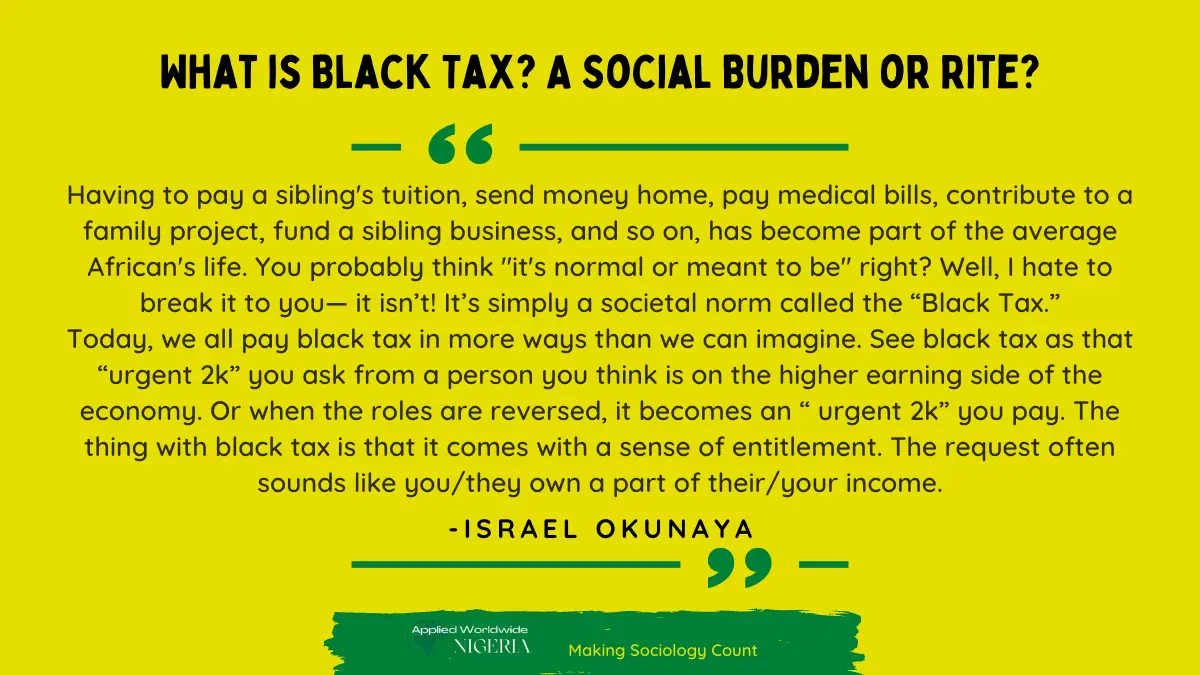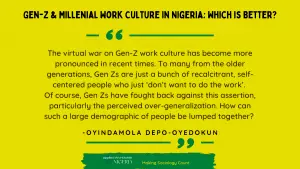Having to pay a sibling’s tuition, send money home, pay medical bills, contribute to a family project, fund a sibling business, and so on, has become part of the average African’s life. You probably think “it’s normal or meant to be” right? Well, I hate to break it to you— it isn’t! It’s simply a societal norm called the “Black Tax.”

What is Black Tax?
Black tax is a term for financial support. It is a part of your disposable income that goes to upsetting bills from parents, siblings, friends, and even extended family members. The term originated from South Africa but is now used by Africans worldwide.
It is a financial press on a person in the family who earns more, lives in the city, is a professional, a business owner, lives abroad, or has “made it.” Typically, this person is expected to fund the family and take care of some expenses. However, whether or not they’re totally capable at all times isn’t anyone’s business.
The Black Tax Chronicle in Africa
This act comes from a continued economic imbalance that can be traced back to apartheid, slavery, historical injustices, structural inequality, and educational disparities. That explains its prevalence in developing countries like Nigeria and other nations with people of color. With a poverty rate of 42.6%, an unemployment rate estimated at 33%, and a minimum wage of N30,000 per month, paying Black Tax in Nigeria is almost unavoidable.
The effect here is that over 95 million Nigerians live in poverty and over 80 million are unemployed where the average family is 5 in number. Therefore, an average of 3-5 persons depends on whoever has “made it” in the family. More so, the African mentality that it takes a village to raise a child does not also help the situation at all. South Africans call it “Ubuntu.” For them, it is a social ideology focusing on people’s loyalty to each other indicating that we achieve ourselves by sharing ourselves with others and caring for those around us.
Black Tax in Our Everyday Lives
Today, we all pay black tax in more ways than we can imagine. See black tax as that “urgent 2k” you ask from a person you think is on the higher earning side of the economy. Or when the roles are reversed, it becomes an “ urgent 2k” you pay. The thing with black tax is that it comes with a sense of entitlement. The request often sounds like you/they own a part of their/your income. It sounds like you/they should get a share every time you/they ask. Being a cultural obligation, it gets constantly misused by family members and close pals.
In most cases, if not all, these ‘money-giving’ people have worked hard to get to where they are. They’ve studied hard to get high-paying jobs and went through all sorts of legal means to amass wealth. And when they finally land on that scale, it feels like they should never have been there.
Black Tax: A Rite that has Become a Burden Thanks to the System
The African society has tagged black tax as ‘payback’ for all the sufferings your parents had to go through raising you. Hence, creating a “hidden burden” that’s on your mind all the time. However, in developed countries with better economic situations, black tax is not rampant. These countries provide resources like food stamps, and financial aid for tuition to help their citizens.
For example, Germany provides its citizens with certain dividends, which allow them to cater to their necessities. Thereby, relieving the more-privileged relatives of the burden of paying Black Taxes. Unfortunately, due to so many imbalances in African society, the case is different.
What’s the Way Forward?
In an ideal society, black tax is supposed to be a positive thing. Initially, this act was meant to propel African families out of poverty. However, most Africans would argue that it has become a burden that weighs on our happiness and general livelihood.
Sheena Allen, founder and CEO of tech companies “CAPWAY and Phocal” expressed the stress of “black tax” in a viral tweet recently. The question now is, should we call this brotherhood or burden, infliction or investment, help or a hack, aid or headache?
Whatever it is, we all must realize that nobody is born to take care of another man’s burden. Everyone should be responsible for whatever situation life puts them in. If luckily someone obliges to care about the rising needs, it shouldn’t be made to be the person’s cross.
In the words of Marsha Barnes, a certified financial planner, social worker, and founder of The Finance Bar, “those impacted by “black tax” need to have uncomfortable conversations about their family members’ financial situation and help them manage their money instead of simply writing checks.” We shouldn’t feed the bad that society has from time past created for us. Also, we hope governmental policies can come in to relieve some of these burdens.







